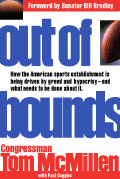An Olympic Remembrance
Speeches
Tom McMillen’s address to the Rhodes Olympic Reception in London about his time as an Olympic basketball player, in the 1972 Munich Olympics as part of the team representing the United States.
John, thank you for that kind introduction. Whenever such nice things are said about me, I realize that I should keep my head on straight and stay humble. I am reminded of something that happened to me a couple of weeks ago. I was at a reception in Washington, DC and I was chatting with the great Olympic swimmer, Michael Phelps, when a young boy came running up to us for our autographs. Of course, Michael graciously signed the autograph for the boy, and when he turned to me, I realized that the boy was only about eight years old. I had retired many years before he was born, and I guessed he had no idea who I was. So I challenged him, “Do you know who I am?” and he shot back, “Yea, you used to be Tom McMillen.” So, you see, humility is very necessary on these occasions.
It is wonderful to be here tonight, celebrating the 3rd Olympics in this great city of London and the connection between the Rhodes Scholarship and the Olympic movement. This connection is best exemplified by the thirty-seven Rhodes Scholars who were also Olympians. Some are here tonight. The Rhodes Scholarship and the modern Olympic Games both originated from the spirit of idealism in the late nineteenth century. As Cecil Rhodes was writing his will, which would establish the Scholarships, the first modern Olympic Games were being held in Athens in 1896. Both the Rhodes scholarships and the Olympic Games shared similar philosophies— “Fight the good fight, ” “the struggle is more important than the triumph,”—and the belief that bringing people together, whether through sports or education, was a noble purpose.
That spirit of idealism was sorely tested in 1972 during the Olympic Games in Munich, Germany, when I was a member of the US team. Terrorism and Cold War politics intruded ruthlessly on a peaceful sports event.
On September 5, 1972, we awakened in the Olympic Village to find that Israeli athletes had been taken hostage by Palestinian terrorists. And by nightfall, eleven Israeli athletes had lost their lives in a brutal attack that changed the Olympics forever. Consider security alone—while $2 million was spent in Munich, in London security will cost over $2 billion.
Five days after this tragic attack, a young USA basketball team (I was a member) took to the floor at 11:45 p. m. on worldwide television to play the championship game for the gold medal against the Soviet Union. There was tremendous pressure on our team—the USA team had won 63 straight Olympic games and 7 gold medals— and we were expected to win. But for most of the game, we were behind. At halftime, we were behind, and with only 8 minutes left in the game, we were down by 8 points. And then, we began our comeback. With a few seconds left, we were down by 2 points, and Doug Collins, one of our guards, stole the ball and was fouled trying to shoot a layup. Collins calmly hit both free throws, 2 of the most pressure-packed free throws ever, and we were up by 1 point with 1 second to go. The Soviets threw the ball in and time expired. We had won. But then the chaos began. An official from the stands forced the resetting of the clock to 3 seconds (even though he did not have authority to do so) and the Soviets tried one more time…and once again we won. The picture of me you can see in the back of the room celebrating was taken after this presumed victory. Again, the officials were forced to replay the final play, and on the third attempt, the Soviets finally scored. As you can imagine, we were completely shocked. When our dispute went to appeal the next day, the vote was 3-2 upholding the Soviet win. The 3 votes in favor of the Soviets were all from Eastern Bloc nations. Cold War politics had intruded on our game, and it was a very hard lesson to understand: that politics is intertwined in everything, including the Olympics. As I have said, Party Secretary Brezhnev and President Nixon could have just arm- wrestled. We didn’t need to play the game.
Forty years later we are still celebrating both the idealism of the Olympics and the Rhodes Scholarships. Both institutions, the Olympic Games and the Rhodes Scholarships have flourished thru the twentieth century and will continue to flourish in this century. It is a great honor for me to celebrate this occasion with you, as I can say that the Rhodes and Olympic experiences were two of the most memorable experiences of my life. My best wishes to all of you, and thank you for allowing me to share these memories with you.








